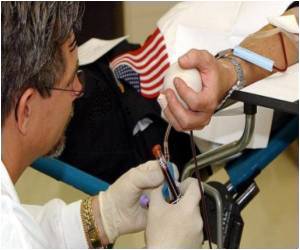
Along with the big chill, an increasing demand for surgical procedures has been blamed for the shortfall, which at one point forced hospitals across the country to postpone at least 50 percent of operations for the short term.
"People are very selfish and they feel their blood is very precious and they don't need to help other people," Zhao, 36, told AFP.
They think "if there is no benefit for me then I won't donate," he said.
Blood donation to strangers has not yet caught on in China, where only 84 out of every 10,000 people give blood -- a fraction of the 454 who do so in developed countries, the health ministry says on its website.
In a bid to boost supplies, Health Minister Chen Zhu recently rolled up his own sleeve to donate along with hundreds of other government officials -- a publicity stunt aimed at encouraging citizens to contribute to blood banks.
Advertisement
While Liu Jiang, director of the Red Cross centre, insists the shortage has been resolved -- at least in the capital -- the centre continued to issue calls for more donors via the state-run media throughout December.
Advertisement
On cold, windy days, "the number of people on the street drops sharply and the amount of blood collected falls significantly," he said.
Haunted by the memory of a blood-selling scandal in central Henan province in the 1990s, when entire villages were devastated by HIV/AIDS after donors received tainted blood, many Chinese are still afraid to give, reports say.
But Liu said the main reasons for the shortage were severe traffic congestion in the capital as well as the cold weather and a lack of mobile donation centres around the city.
"Convenience is really important for blood donation. It is impossible to ask donors to take a day off work just to go to blood collecting centres," he said.
Beijing has just 27 mobile donation centres, which collect 90 percent of the city's blood, for a population of 19 million.
A middle-aged man waiting at the Red Cross centre to donate blood told AFP he had been sent by the restaurant where he worked as a chef. He said he was making his 30th donation -- something he considered to be his civic duty.
"I donate blood for free as a gesture of my love (for society)," said the man surnamed Ren as he puffed on a cigarette.
"I donated for the victims of the Sichuan and Yushu earthquakes ... wherever it is needed."
As blood stocks plunged in recent months, people with relatives in hospital waiting for operations were reportedly donating their own blood so their loved ones could have surgery.
According to Chinese law, each person can donate a maximum of 400 millilitres of blood every six months.
If a patient requires more than that, relatives would have to ask friends to donate on their behalf or pay so-called "blood agents" to find strangers to donate for them, the Global Times said.
During the latest shortage, the black market price for 400 millilitres of blood doubled to 3,000 yuan (450 dollars), it said.
More than half of the country's donors are university students and migrant workers, according to Xinhua.
For people like Zhao, donating blood is not a way to earn money but a more secure way to help other people.
"I don't want to give money. Society is very complicated and I don't know if the money will reach the people who need it," he said.
Source-AFP











